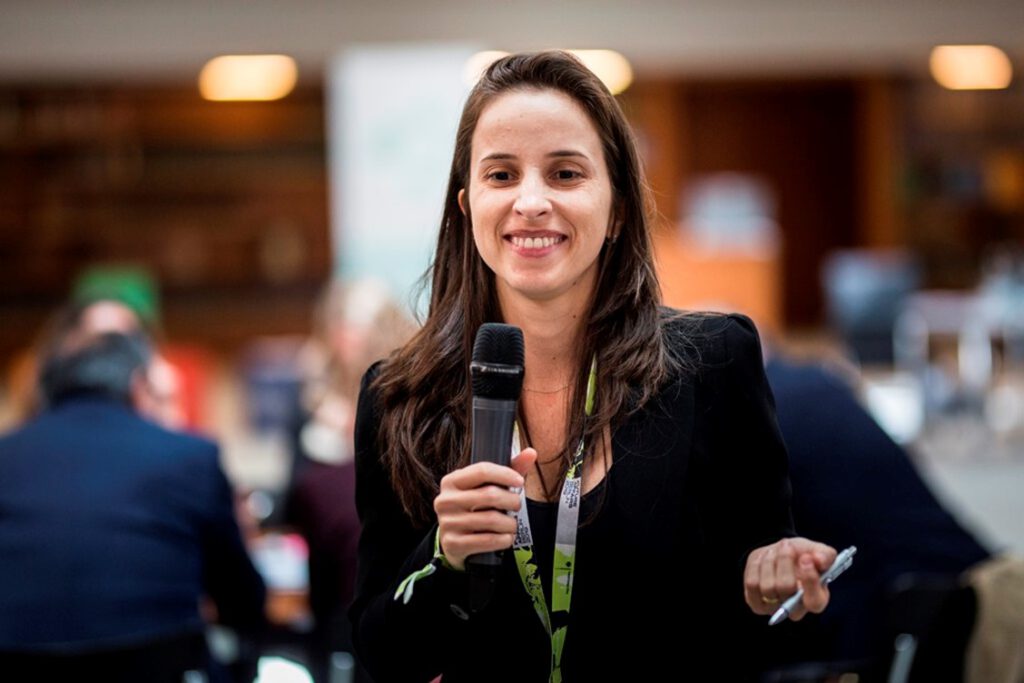Blog
How Can Ownership of the 2030 Agenda Be Increased?
By Flávia Alfenas and Jörg Reckhenrich
During the Future Affairs Berlin 2019 conference at the Federal Foreign Office on 29 May, where representatives from Germany, Latin America and the Caribbean discussed how future technologies are transforming global diplomacy and creating new challenges, Flávia hosted the GDL Session “Co-creating a digital agenda for peace and sustainable development”. In her session, she invited the participants to reflect on the digital transformation, its challenges and opportunities for the Agenda 2030.
Jörg: The 2030 Agenda is a broad framework which takes into account the different dimensions of sustainable development. How do you break the SDGs down into something concrete?
Flávia: A group of colleagues and I created a session on “SDGs and behavioural change: moving towards action”. We wanted to address the challenge of implementing the 2030 Agenda at an individual and a community level. The key question is: how can we transfer the 2030 Agenda into daily life? We start with the individual context and personal stories of the participants. Then we link this information to the SDGs. We named our approach “The Bookinho”. It is a concept that combines elements of storytelling, gamification and prototyping. The goal is to encourage participants to come up with concrete ideas to align their behaviour with the SDGs. This approach includes self-reflection exercises and a life-sized SDG board game, the “Sustainable Ideas Game”. The participants are engaged in an open and playful dialogue to come up with feasible ideas. Once the ideas are generated, we break them down into concrete project development steps.
Jörg: The format is very interactive. How did it all start
Flávia: In 2017, I participated in the Managing Global Governance programme (MGG Academy). It brings together young professionals from Brazil, Mexico, South Africa, India, Indonesia, China and Europe. The goal is to engage the participants in a dialogue and learning process on global challenges. It is financed by Germany’s Federal Ministry for Economic Cooperation and Development (BMZ) and implemented by the German Development Institute (DIE).
The concept was developed during the MGG Academy by a group of professionals – Adi Yudanto (Indonesia), Diego Zubillaga (Mexico), Refilwe Nkomo (South Africa), and Rafael Andrezo and myself from Brazil. Our interest stemmed from our own observations about the difficulty in aligning our daily life to the SDGs. We were interested in seeing which elements influence and trigger behavioural change best. We systematically started with an interactive approach. We interviewed artists, activists, researches, educators and leadership trainers, as well as people like us, who sense the urgency of individual transformation.
Jörg: What were the insights from these interviews
Flávia: For instance, we learned how important it is to have a broad variety of stakeholders at the table. Everybody brings in their own perspective, both personal and professional. That must be taken into account and balanced out. Based on the results of our research, we started to develop “The Bookinho”. We wanted to foster engagement and stimulate individual transformation.
Jörg: Did “The Bookinho” also have an impact on you yourself?
Flávia: When I went back to Brazil I wanted to engage in the ecosystem of social innovation. Therefore, I founded the social innovation lab Zebralab. I thought about transformative leadership and how to contribute to a positive narrative regarding global challenges.
Jörg: Your session at the Forum: Future Affairs included a gamification aspect. Where did this idea come from
Flávia: The structure I used during the session was a tailored version of the “Sustainable Ideas Game”. It is the interactive part of “The Bookinho” approach. It was specifically designed for the direction and goals of the conference: to mix people on a broader level through interaction. It is a good example of the adaptability of the original approach to different settings.
Jörg: Where else has this approach been used? Can you give me some examples?
Flávia: It was part of a “Game Zone” during the UN Global Festival of Action for Sustainable Development in Bonn, Germany, in March 2018. It was also presented at a brown bag meeting at the UN Framework Convention on Climate Change (UNFCCC) conference and in a workshop format during the UN Summer Academy in August 2018. Further, it was part of the opening week of Managing Global Governance 2018 at the German Development Institute (DIE). It has also been used at universities and government institutions in Brazil.
Jörg: Doing these activities, what inspires you most
Flávia: I am passionate about experimental, open and interactive learning approaches. I like to understand how these can help to drive social change individually and at community level. The learning process fascinates me. I truly believe in collaboration. I see myself as a person who invites others and provides the appropriate framework. I want to foster a fruitful discussion and projects that focus on concrete achievements.
About the authors:
Flávia Alfenas is a demographer and social entrepreneur working in the field of education for sustainable development and she is also the founder of ZEBRALAB, a collaborative space for co-creating innovative solutions to tackle complex global challenges.
Jörg Reckhenrich is an artist reflecting on the human condition and positive psychology in his art projects and he loves to combine intensive reflecting on art with coaching sessions, focusing especially on personal growth, writing articles and teaching on creative leadership.
Published on October 08, 2019.
Photo credit: David Löcker
